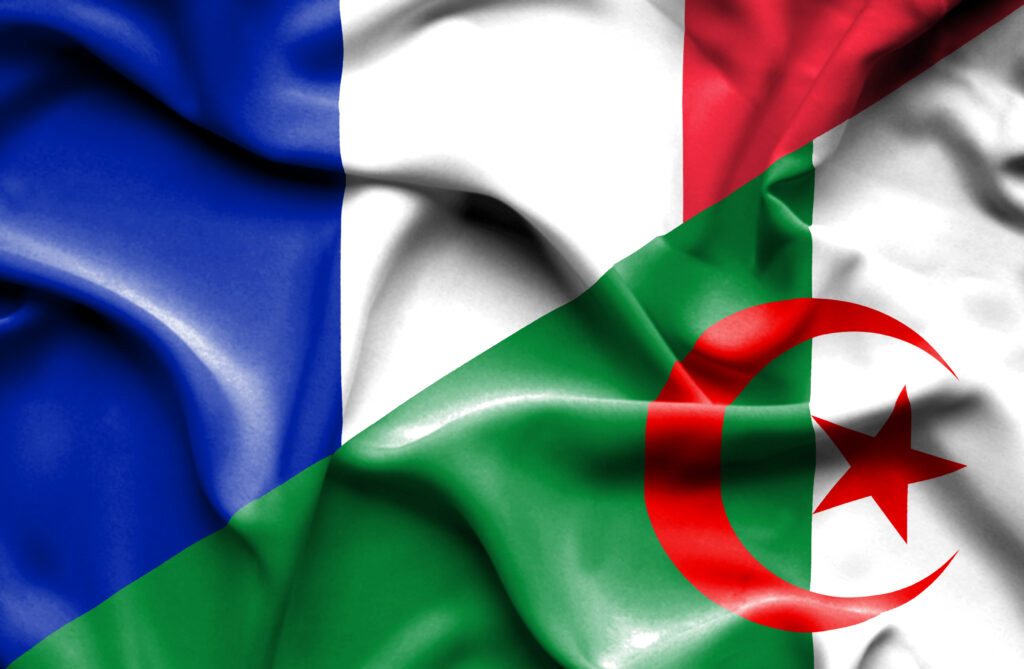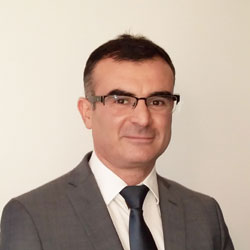Interviews / Middle East / North Africa
14 April 2025
Franco-Algerian Relations: Behind the De-escalation of Tensions, What Are the Stakes?

While a diplomatic crisis has opposed Paris and Algiers — notably following Emmanuel Macron’s decision in October 2024 to support Moroccan sovereignty over Western Sahara — exchanges have recently resumed, suggesting a gradual de-escalation of tensions. What are the bilateral motivations behind this diplomatic rapprochement? In what domestic contexts did this crisis unfold? What strategic stakes surround the foreign policies of both countries? An overview with Brahim Oumansour, Associate Research Fellow at IRIS, where he heads the Maghreb Observatory.
How Do You Interpret the Warming of Franco-Algerian Diplomatic Relations After Eight Months of Unprecedented Crisis? To What Extent Do Domestic Political Stakes on Both Sides Influence These Dynamics?
The current crisis between Algiers and Paris is the most serious since 1962. It has been marked both by the unprecedented harshness in tone and language, and by the longevity of the standoff, which has now lasted for around eight months. These tensions have their roots in Emmanuel Macron’s U-turn, as he expressed support for the Moroccan autonomy plan over Western Sahara — an issue already at the heart of tensions between Algiers and Rabat, whose diplomatic relations have been severed since 2021.
Since last July, the crisis has been exacerbated by the arrest of Franco-Algerian writer Boualem Sansal, and the issue of Algerian nationals subject to an Obligation to Leave French Territory (OQTF), whom Algiers refuses to take back. These two issues have crystallised tensions and sparked intense media debate in France, further inflamed by the “influencers” affair and the Mulhouse attack.
We are not yet at the stage of a warming of diplomatic relations, but rather in a process of de-escalation. This began with a phone call between the two heads of state, Emmanuel Macron and Abdelmadjid Tebboune, followed by the visit of the French Minister for Foreign Affairs, Jean-Louis Barrot, to Algiers on 6 April. These developments reflect a certain pragmatism from both leaders, a desire to manage the crisis away from political-media posturing and the inflammatory rhetoric favoured by parts of the French government — led notably by the Interior Minister, Bruno Retailleau.
Naturally, this crisis has emerged within a context already strained by the sensitive nature of Franco-Algerian relations, particularly due to the colonial past which has led to a unique relationship between the two countries. This is marked by the presence of a large and diverse Franco-Algerian population, or French citizens with ties to Algeria in various ways: Harkis, Pieds-Noirs, Algerian Jews, Franco-Algerian marriages, and so on. This singularity creates a quasi-intimate relationship between the two nations and fosters a blurring of lines between foreign and domestic policy on both sides.
On the Algerian side, the crisis unfolds in a delicate context shaped by regional instability and fragility linked to the low electoral legitimacy of the September 2024 vote, which saw a record abstention rate. In this setting, the frequent invocation of tensions related to the colonial past — particularly through state media — serves to bolster nationalist sentiment and rally support around Abdelmadjid Tebboune’s government.
On the French side, these tensions arise within the framework of an unprecedented political crisis, worsened since Emmanuel Macron’s dissolution of Parliament. Added to this is the sensitivity of part of the French political class on issues relating to Algeria, particularly within hard-right and far-right circles. These groups seek to capitalise on the current crisis between Paris and Algiers to boost their media presence and attract a segment of the electorate in view of leadership contests — notably within Les Républicains — and the 2027 presidential election.
The crisis notably began following Emmanuel Macron’s support for an autonomy plan under Moroccan sovereignty for Western Sahara. How can current French policy towards the Maghreb and the issues at stake there be defined?
The Maghreb is a strategically important region for France, particularly in the context of declining French influence in Africa and the setbacks it has suffered — notably in Burkina Faso and Mali — with the withdrawal of its military forces from these territories.
As a result, Paris maintains very deep and close relations with the Maghreb countries, either on a bilateral basis or within a multilateral framework, notably through the 5+5 Defence Initiative, which brings together the five North African countries and the five European Mediterranean countries.
There are also other formats such as the Union for the Mediterranean, as well as broader forms of cooperation between the Maghreb countries, the European Union, and NATO. It is worth noting that most Maghreb countries are NATO partner nations with observer status.
The Maghreb countries also play a role as a buffer against migratory flows, both from within the Maghreb itself and from Sub-Saharan Africa, which continue to grow due to regional instability, particularly in the Sahel.
There is also a security dimension: the fight against terrorism and organised crime, whether around the Mediterranean or in the Sahel. All of this obviously requires close security cooperation with the Maghreb countries, whether in intelligence sharing or technical assistance.
Economically too, the Maghreb represents an important market. Countries such as Morocco have strengthened their economic cooperation with France and are more open to foreign investment — as demonstrated by the presence of CAC 40 companies on Moroccan soil. Algeria, for its part, has launched massive projects in the energy, agri-food, and infrastructure sectors… Overall, the Maghreb offers investment opportunities across various sectors.
However, there has been a decline in France’s presence in Algeria, which for a long time was the country’s main supplier, now overtaken by China and more recently by Italy. This decline is evident more broadly across all Maghreb countries, where French market shares are being eroded by fairly aggressive — even highly active — competition, notably from China, Russia, Italy, and also Turkey.
On a geostrategic level, the Maghreb countries are now seen by France as a means of projecting itself into Africa. The idea is also to aim for a redeployment towards West African and Sahel countries, building on the strong ties that Maghreb states have established with countries in the region, particularly those of ECOWAS in West Africa.
However, the issue of Western Sahara has long been a thorn in inter-Maghreb relations and in those maintained by Algeria and Morocco with their respective partners. This matter has undermined various regional initiatives — the Arab Maghreb Union (AMU), the Union for the Mediterranean — and demands a great deal of caution, particularly from European partners, who strive to balance relations with the two Maghreb heavyweights: Algiers and Rabat. The recognition, in December 2020, of Moroccan sovereignty over Western Sahara by Donald Trump, in exchange for the normalisation of relations with Israel, prompted Rabat to harden its stance towards its partners, particularly in Europe. This led to Spain’s U-turn in 2022 after facing migratory pressure.
France’s reversal on the issue of Western Sahara can also be explained by this, especially as a significant part of the French political class already supports the Moroccan position. The reasoning is that there are both investment opportunities in Western Sahara and the fact that Morocco has succeeded in developing very close cooperation with French companies, positioning itself as an economic hub for both Morocco and the African continent. This is particularly due to its cooperation efforts with ECOWAS countries. On the other hand, there is a sense among French diplomats of weariness and frustration with Algeria’s lack of openness to French investment, where the authorities have chosen economic protectionism and openness to other competing partners such as Italy and China.
How Do You Analyse the Nature of Algerian Diplomacy and the Determinants of Its Foreign Policy?
Algeria has, in recent years, been attempting to reassert its regional position after more than two decades of diplomatic decline and withdrawal, in a context marked by escalating tensions with neighbouring Morocco and regional instability — particularly in the Sahel and Libya — which present major challenges for Algiers.
Moreover, the highly unstable and uncertain global context is destabilising the energy market, which has long served as an important lever of influence for Algeria — although the spike in energy prices following the war in Ukraine has been favourable to the Algerian economy.
The issue of Western Sahara and the historical rivalry with Morocco since independence remains a central element of Algerian diplomacy. This largely explains its reaction to Spain’s U-turn on the matter, as well as, more recently, towards France, with the recall of its ambassador in both cases. While relations with Madrid have been normalised through the return of the Algerian ambassador, this is not yet the case with Paris, where the ambassadorial post remains vacant to this day, with a chargé d’affaires serving in the interim.
It is worth noting that Algeria has supported the Polisario Front and the right to self-determination of the Sahrawi people for years and hosts approximately 173,000 Sahrawi refugees on its territory, in camps located in south-western Algeria. Morocco, on the other hand, claims sovereignty over the territory.
In recent years, a hardening of Algerian diplomacy has been observed, linked to the escalation of tensions with its neighbours, which has fuelled a sense of encirclement. One may cite the chronic instability in the Sahel, exacerbated by diplomatic tensions since the coup in Mali that brought Assimi Goïta to power. The junta officially denounced the Algiers Agreement signed between Bamako and the Azawad rebels in 2015 and has favoured a confrontational approach towards the Tuareg rebels. This posture heightens instability and concerns on the Algerian side. It should also be recalled that the Malian issue is one of internal security for Algeria, as the two countries share around 1,400 kilometres of border. The Algerian regime’s response to the recent incident involving a Turkish-made Malian drone that allegedly entered and was shot down over Algerian territory is symptomatic of the prevailing concern and Algiers’ intransigence towards any perceived threat at its borders. The 2013 terrorist attack on the In Amenas gas facility remains a defining moment for the Algerian army.
It is also important to highlight that behind the instability in the Sahel lies the emergence of new players or the rise of foreign powers such as Russia — through the Wagner Group, now partly replaced by Africa Corps — but also other actors such as Turkey, the United Arab Emirates, and Morocco. All are seeking to strengthen their influence in the region and are perceived by Algeria as security, economic, and strategic threats, standing in the way of key national projects, particularly in the energy sector.
Algeria has, for instance, relaunched the Trans-Saharan gas pipeline project with Nigeria, via Niger, to transport gas to the European Union. These investment plans represent a major axis of its regional redeployment strategy and its projection towards both Africa and Europe. It is also a way of boosting its gas revenues and economic rent.
Other projects are also being carried out by Sonatrach, Algeria’s national oil company, which is developing partnerships with several Sahelian countries. In parallel, there has been the emergence of Algerian industrial players, whom the authorities now seek to support to foster the establishment of regional economic partnerships.
In this climate of regional tensions, geopolitical and economic rivalries, and strategic shifts, Algeria is striving to reposition itself as a major regional actor, while protecting its borders, its interests, and its place on the diplomatic stage. Algiers should increasingly focus its efforts on promoting dialogue at the local and regional levels and attempt to ease tensions with its neighbours in order to create a conducive environment for cooperation and the development of its economic projects, both domestically and abroad.

